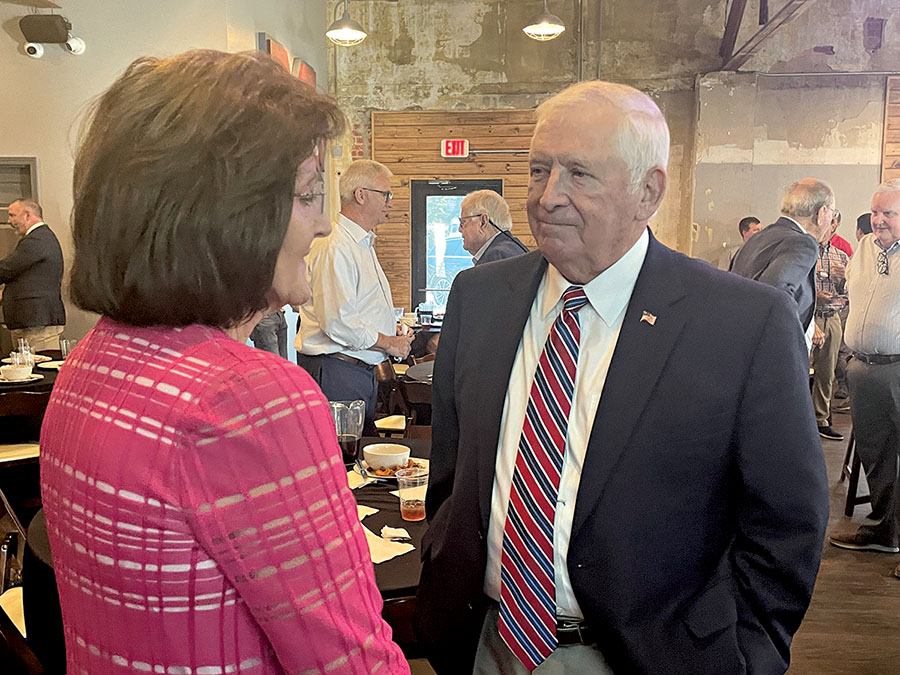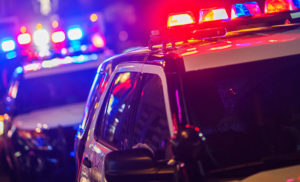STARKVILLE — Everybody has a story to tell when it comes to where they were on September 11, 2001. But some were closer to the tragedy than others.
Lt. Gen. Howard Cross, retired adjutant general of the Mississippi National Guard, told his story on Monday afternoon to the Starkville Rotary Club, describing his role in arranging the country’s air defenses from Andrews Air Force Base’s Crisis Action Center on that day.
Cross said he started the day in the Pentagon dining room, where he was working as the commander of the Mississippi Air National Guard and as advisor to four-star General Don Cook. From there, he was supposed to fly from Andrews Air Force Base to Toledo, Ohio to help with training F-16 fighter pilots. But that plan quickly changed.
“As we drove out, Flight 11 impacted the (World Trade Center’s) North Tower,” Cross said. “As we got in the airplane, getting ready to get on it, a car pulled up with a captain. And he said… ‘Sir, you need to come to the command post. Something’s happened. They’re scrambling jets.’”
At first, Cross said, some assumed the flight crashing was an accident. But once Flight 175 crashed into the WTC’s South Tower, it was evident the country was under attack.
When he reached the command center, Cross started assembling the Crisis Action Team at Andrews. He was also given the order to get as many aircraft armed as quickly possible, since fighter jets were in short supply.
“About that time, the phone rang again. It was the United States Secret Service, from the White House. They said, ‘General, you have to get aircraft over the Capitol and the White House now.’ I said, ‘I don’t have any aircraft to get over the Capitol and the White House now.’”
Cross’s temporary solution to this problem was calling two fighter jets – which were about to go out on a practice mission, each only armed with 200 practice rounds – to turn left and patrol over the restricted area above the White House.
At that time, Cross spoke with Vice President Dick Chaney, asking for the rules of engagement to best protect the Capitol. Typically, the pilots were told to intercept, track and escort planes that were off course.
But on that day, Chaney gave Cross the order to engage with weapons free.
“That’s actually the first time that order had been issued,” Cross said. “To kill Americans in the air to protect Americans on the ground. A bold, sore order that still rings on my conscience today.”
Cross said the two pilots worked out their tactics while in the air, preparing to engage in a “kamikaze formation” to protect the Capitol, which involved being positioned in the air to forcibly ground any flights that caused a threat. Eventually, two more planes arrived, fully armed to help with patrolling the skies, and President George W. Bush confirmed the order of weapons free.
On that day, Cross said, 4,360 aircraft were over the skies of the United States. The Federal Aviation Administration was still in confusion, trying to track American Flight 11, when they issued a command Cross had never heard before.
Finally, the FAA gave the order I’d never heard before for all aircraft to land,” Cross said. “The military had assumed responsibility of the airspace above the United States.”
Cross said all pilots had to suddenly scramble to find places to land their planes and report that they were safe. Eventually, all but the four used in the attacks on the World Trade Center, the Pentagon and Flight 93 – which crashed in an empty field – landed.
By the end of the day, 2,996 lives had been lost from the attacks.
Cross compared the confusion he witnessed during the 24 hours he spent working that day to “the fog of war.” That confusion, and other confusion in America’s objectives, still concerns Cross to this day. But Cross presented the Rotarians with a mission of building hope for the future.
“On 9/11, our radar didn’t go down low enough,” Cross said. “We need you … to (cover) the surface of the ground in our community … where our youth learn values of patriotism. Of faith, hope, love and self esteem to serve this country.”
You can help your community
Quality, in-depth journalism is essential to a healthy community. The Dispatch brings you the most complete reporting and insightful commentary in the Golden Triangle, but we need your help to continue our efforts. In the past week, our reporters have posted 41 articles to cdispatch.com. Please consider subscribing to our website for only $2.30 per week to help support local journalism and our community.







